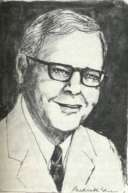 |
Home | Search | Browse | About IPO | Staff | Links |
 |
Home | Search | Browse | About IPO | Staff | Links |
|
The
Illinois House
... and never
was heard
a discouraging
word  By SHELLEY DAVIS IN A GAME plan worked out before Christmas, Rep. George Ryan (R., Kankakee) was elected the 57th speaker of the House of the 82nd General Assembly. Republicans had won control of the House in the November election after six years of domination by a Democratic majority. The minority Democrats held a party caucus the night before the January 14 speakership election, paving the way for Michael Madigan (Chicago) to win the top leadership job of the minority party. In a unanimous decision, the Democrats eliminated all other contenders for the job, throwing their support behind the former House majority leader. The election, conducted by a simple roll call vote, was without surprises. Ryan was chosen by all 90 of his fellow Republicans, and the 82 Democrats present voted for Madigan (absent were Reps. William Laurino and Daniel O'Brien, both from Chicago, and Thomas Hanahan of McHenry). In a show of good sportsmanship, Ryan and Madigan voted for each other. Ryan was chosen as the Republican candidate for speaker in a December party caucus shortly after Gov. James R. Thompson named James Edgar as secretary of state, erasing any speculation that Ryan might get the job. Madigan, however, was not so obvious a choice. Although the four-term representative at first seemed the likely candidate, challengers were surfacing against the man who had served as his party's majority leader for the last four years. If it weren't for Illinois' Democratic Chicago-downstate split, outgoing Speaker William Redmond (Bensenville) would have been the likely choice. The one possible Chicago rival to Madigan appeared to be Thaddeus Lechowicz. Other challenges came from downstaters Gerald Bradley (Bloomington) and Richard Mautino (Spring Valley), while the names of Michael McClain (Quincy) and E.J. "Zeke" Giorgi (Rockford) were also tossed into the ring. Madigan needed at least 44 votes from his 86 fellow Democrats to be elected. With 45 members hailing from Chicago or the suburbs and usually voting with the Chicago bloc, a split between Madigan and Lechowicz was anticipated. However, before the January caucus Redmond decided not to challenge Madigan, and Lechowicz, sensing the battle ahead, withdrew his candidacy. From that point on, Madigan was a sure bet — he drew everything together and received no opposition in caucus. Once on the floor, Redmond nominated his former second-in-command. The nomination was seconded with a show of unity and acceptance by Reps. Lechowicz, Eugenia Chapman (Arlington Heights), James Taylor (Chicago), Raymond Ewell (Chicago), and Jim McPike (Alton). In addition to declining the minority leadership position, the 72-year-old Redmond also refused to be named to the proposed speaker emeritus position. Democrats introduced the new job in the fall as a possible compromise position should an intraparty fight for the top spot arise. The position would have given Redmond an extra $10,000 salary but no clearly defined duties. Redmond instead will serve in an ex officio capacity on Madigan's leadership team as consultant and advisor to the chief Democrat. The Republicans are now in control of the lower chamber for the first time since 1975. The November election netted the Republicans three additional seats in the House, giving them a clear majority of five, 91-86. This gives Ryan and the Republicans control of committee chairmanships and members. The most important assignments will be to the Elections Committee, which will indirectly determine the 59 members who will lose their seats in two years when the House is pared down to 118 members. The Republicans are now the political leaders on the floor as well as the controlling factor behind the scenes. March 1981/Illinois Issues/29 During this orderly transition, hard feelings could not be found as the Democrats handed over the reins of House control. Ryan accepted the speakership, feeling "humbled yet bouyed," seeking guidance from Redmond's six-year accumulation of wisdom. Redmond also wanted to get Ryan started on the right foot by presenting the new speaker with a can of spinach and a box of cigars that Redmond had received from his predecessor. Republican W. Robert Blair. Ryan continued on a light note by turning to Minority Leader Madigan and saying, "May you forever be minority leader," a quip Ryan had heard too many times from Redmond in the last four years. The day was relaxed and filled with levity as House members earlier sat back and enjoyed a humorous anecdote from downstate Republican C. L. McCormick of Vienna. The 18-year veteran was reelected to the House in November after a six year absence. In approving Ryan's nomination for speaker, McCormick expressed hope that the extra clout Ryan would have as speaker might help him to finally get the roads fixed around Kankakee, which McCormick said are worse than those in Southern Illinois. Twenty-eight brand new members were also sworn in on January 14. Four other new members were rejoining the House after at least one session's absence. All House members reconvened on February 3, but only Republicans heard the governor's State of the State. Chicago Democrat Sylvester Rhem, an administrator with the Chicago Human Services Department, was also named January 29 to replace Rep. Taylor who finally was named state senator to replace former state Sen. Harold Washington who was sworn into the U.S. House January 5. This delay in naming Washington's replacement was part of the reason for the snafu in the Senate leadership battle. March 1981/Illinois Issues/30 |
|
|